Despite low rain, valley reaps 'record-breaking' paddy crop
By ANI | Published: October 13, 2020 03:07 PM2020-10-13T15:07:06+5:302020-10-13T15:35:03+5:30
Despite low rainfall in the region, farmers in Jammu and Kashmir are expecting a "record-breaking" harvest of 10 lakh metric tonnes of paddy this season.

Despite low rain, valley reaps 'record-breaking' paddy crop
Despite low rainfall in the region, farmers in Jammu and Kashmir are expecting a "record-breaking" harvest of 10 lakh metric tonnes of paddy this season.
According to Syed Altaf Ajaz Andrabi, Director of Agriculture, the Union Territory has wonderful cropping season this year.
"We are harvesting a record-breaking crop here this year. In some areas, we are harvesting 75-78 quintal per hectare," said Andrabi.
Jammu and Kashmir has farming land spread across 1,41,000 hectares, on which, it is expecting 10 lakh metric tonnes of paddy crop, that is 72 to 74 quintal per hectare," said the agriculture director. "However, estimates are yet to come," he added.
All thanks to the department, which substituted the low rainfall by continuous water supply, said Fayaz Ahmad, a farmer in the valley.
"Despite low rainfall in the region, we have harvested more as compared to the last year," he added.
Another challenge faced by the farmers was the impact of COVID-19. Akhter Rameez, a farm labourer, explained there were not enough hands on the field as a result of the coronavirus-induced lockdown and subsequent reverse migration of labourers.
"We are glad that we have got good crops this year, but the harvesting work is being delayed due to the shortage of workers. Had we had enough workers, the fields would have been cleared by now," said Mumtaz Ahmad, another farmer.
To overcome the unavailability of workers, the local farmers are supporting each other and working on each others' fields in a traditional manner.
"We had heard local residents working in fields of each other earlier. Now people have adapted the old idea," one Hussain Mir said.
( With inputs from ANI )
Disclaimer: This post has been auto-published from an agency feed without any modifications to the text and has not been reviewed by an editor
Open in app